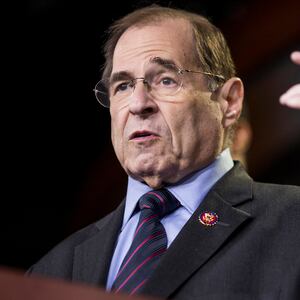The House Judiciary Committee moved Wednesday to hold Attorney General William Barr in contempt of Congress for ignoring a subpoena, confirming the resolution by a 24 to 16 vote on party lines. The matter now goes to the full House.
Barr is just the second Cabinet member in U.S. history to face that punishment. The last one to be held in contempt of Congress was Eric Holder in 2012, when he failed to turn over documents related to the “Fast & Furious” weapons-trafficking scandal. An inspector general later cleared Holder of any wrongdoing.
Barr was held in contempt because he failed to issue the judiciary committee the full, un-redacted Mueller report. The Justice Department and the committee had attempted to negotiate a resolution about if and how an unredacted report would make its way to Congress but no deal appears imminent. If anything, talks appear to have completely broken down. The Justice Department declared on Wednesday morning that the president had now "asserted executive privilege over the entirety" of the Mueller report.
ADVERTISEMENT
“We did not relish doing this but we had no choice. Attorney General Barr proved himself to be a personal attorney to President Trump rather than attorney general of U.S.,” House Judiciary Chairman Jerry Nadler said Wednesday following the markup session.
“We cannot have a government where all the information is held in the executive branch. It’s an attack on the ability of the American people. It is an attack on the essence of our democracy. There can be no higher stakes than this attempt to arrogate all power to the executive branch away from Congress and the American people,” Nadler said. “We are now in a constitutional crisis.”
The Justice Department said that Barr could not comply with the Judiciary Committee’s subpoena because doing so would mean breaking the law. A spokesperson said that the department had engaged with the committee “in good faith in an effort to accommodate its stated interest in these materials” and accused House Democrats of ignoring those efforts.
“Unfortunately, rather than allowing negotiations to continue, Chairman Nadler short-circuited these efforts by proceeding with a politically motivated and unnecessary contempt vote,” DOJ spokesperson Kerri Kupec said in a statement.
The markup for a contempt vote came after weeks of back-and-forth talks between House Judiciary Democrats and the Department of Justice over terms for lawmakers to review Special Counsel Robert Mueller’s report with fewer redactions and with access to the underlying evidence he collected. The committee issued a subpoena to access those materials but Barr has fought them.
“This is information we are legally entitled to receive and we are constitutionally obligated to review.” Nadler said in the contempt vote markup. “I would remind the Members that the Mueller report is no ordinary, run of the mill document—it details significant misconduct involving the President, including his campaign’s willingness and eagerness to accept help from a hostile foreign government.”
In addition to the back and forth over subpoenaed material, the two sides are also in disagreement over whether the attorney general should testify before the committee. Barr has refused to do so after the Department of Justice said House Judiciary Chairman Jerry Nadler’s demands for staff attorneys to question the attorney general about his handling of the Mueller report were “unprecedented and unnecessary.”
Nadler had previously warned that the committee would seek to hold Barr in contempt if he did not appear.
“If good-faith negotiations don’t result in a pledge of compliance... the next step is seeking a contempt citation against the attorney general,” Nadler said last week, adding that Barr was trying to “blackmail the committee into not following the most effective means of eliciting the information we need... He is terrified of having to face a skilled attorney."
The committee has also said it wants to hear Mueller testify. The Daily Beast reported this week that he was willing to appear but that DOJ was reluctant to set a date. Nadler said the committee would like to hear from the special counsel on May 15. Whether Mueller ends up coming remains unclear. But experts say that the breakdown in conversations between the executive and legislative branch had already reached remarkable levels.
“There is always some back and forth and negotiation over whether and when someone testifies,” said Elliot Williams, a former deputy assistant attorney general. “The two sides work out things like length of testimony, the subject matter of the hearing as well as other things. But usually they always come to an agreement.”








